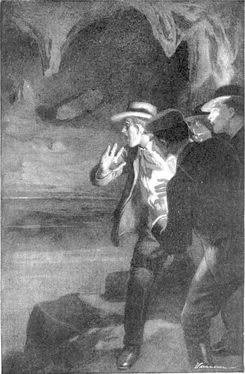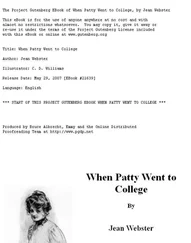Jean Webster - The Four-Pools Mystery
Здесь есть возможность читать онлайн «Jean Webster - The Four-Pools Mystery» весь текст электронной книги совершенно бесплатно (целиком полную версию без сокращений). В некоторых случаях можно слушать аудио, скачать через торрент в формате fb2 и присутствует краткое содержание. Жанр: Классический детектив, на английском языке. Описание произведения, (предисловие) а так же отзывы посетителей доступны на портале библиотеки ЛибКат.
- Название:The Four-Pools Mystery
- Автор:
- Жанр:
- Год:неизвестен
- ISBN:нет данных
- Рейтинг книги:3 / 5. Голосов: 1
-
Избранное:Добавить в избранное
- Отзывы:
-
Ваша оценка:
- 60
- 1
- 2
- 3
- 4
- 5
The Four-Pools Mystery: краткое содержание, описание и аннотация
Предлагаем к чтению аннотацию, описание, краткое содержание или предисловие (зависит от того, что написал сам автор книги «The Four-Pools Mystery»). Если вы не нашли необходимую информацию о книге — напишите в комментариях, мы постараемся отыскать её.
The Four-Pools Mystery — читать онлайн бесплатно полную книгу (весь текст) целиком
Ниже представлен текст книги, разбитый по страницам. Система сохранения места последней прочитанной страницы, позволяет с удобством читать онлайн бесплатно книгу «The Four-Pools Mystery», без необходимости каждый раз заново искать на чём Вы остановились. Поставьте закладку, и сможете в любой момент перейти на страницу, на которой закончили чтение.
Интервал:
Закладка:
"At times they were," I admitted, "but things had been going rather better for the last few days."
"Until the night before the murder. They quarreled then? And over a matter of money?"
"Yes. Radnor makes no secret of it. He wanted his father to settle something on him, and upon his father's refusal some words passed between them."
"And a French clock," suggested Terry.
I acknowledged the clock and Terry pondered the question with one eye closed meditatively.
"Had Radnor ever asked for anything of the sort before?"
"Not that I know of."
"Why did he ask then?"
"Well, it's rather galling for a man of his age to be dependent on his father for every cent he gets. The Colonel always gave him plenty, but he did not want to take it in that way."
"In just what way did he want to take it?" Terry inquired. "Since he was so infernally independent why didn't he get to work and earn something?"
"Earn something!" I returned sharply. "Rad has managed the whole plantation for the last three years. His father was getting too old for business and if Rad hadn't taken hold, things would have gone to the deuce long ago. All he got as a regular salary was fifty dollars a month; I think it was time he was paid for his services."
"Oh, very well," Terry laughed. "I was merely asking the question. And if you will allow me to go a step further, why did Colonel Gaylord object to settling something on the boy?"
"He wanted to keep him under his thumb. The Colonel liked to rule, and he wished everyone around him to be dependent on his will."
"I see!" said Terry. "Radnor had a real grievance, then, after all—just one thing more on this point. Why did he choose that particular time to make his request? You say he has had practical charge of affairs for the past three years. Why did he not wish to be independent last year? Or why did he not postpone the desire until next year?"
I shrugged my shoulders.
"You'll have to ask Radnor that." I had my own suspicions, but I did not wish to drag Polly Mathers's name into the discussion.
Terry watched me a moment without saying anything, and then he too shrugged his shoulders as he turned back to the newspaper clippings.
"I won't go into the matter of Radnor's connection with the ha'nt just now; I should like to consider first his actions on the day of the murder. I have here a report of the testimony taken at the inquest, but it is not so full as I could wish in some particulars. I should like to have you give me the details. First, you say that Radnor and his father did not speak at the breakfast table? How was it when you started?"
"They both appeared to be in pretty good spirits, but I noticed that they avoided each other."
"Very well, tell me exactly what you did after you arrived at Luray."
"We left our horses at the hotel and walked about a mile across the fields to the mouth of the cave. We had lunch in the woods and at about one o'clock we started through the cave. We came out at a little after three, and, I should say, started to drive back about half past four."
"Did you notice Radnor through the day?"
"Not particularly."
"Did you see either him or the Colonel in the cave?"
"Yes, I was with the Colonel most of the time."
"And how about Radnor? Didn't you see him at all?"
"Oh, yes. I remember talking to him once about some queerly shaped stalagmites. He didn't hang around me, naturally, while I was with his father."
"And when you talked to him about the stalagmites—was there anyone else with him at the time?"
"I believe Miss Mathers was there."
"And he was carrying her coat?"
"I didn't notice."
"At least he left it later in what you call the gallery of the broken column?"
"Yes."
"I see," said Terry glancing over the printed report of the inquest, "that the coroner asked at this point if Radnor were in the habit of forgetting young ladies' coats. That's more pertinent than many of the questions he asked. How about it? Was he in the habit of forgetting young ladies' coats?"
"I really don't know, Terry," I said somewhat testily.
"It's a pity you're not more observing," he returned, "for it's important, on the whole. But never mind. I'll find that out for myself. Did you notice when he left the rest of the party?"
"No, there was such a crowd of us that I didn't miss him."
"Very well, we'll have a look at his testimony. He left the rest of you in this same gallery of the broken column, went straight out, strolled about the woods for half an hour or so and then returned to the hotel. I fancy 'strolled' is not precisely the right word, but at any rate it's the word he uses. Now that half hour in the woods is an unfortunate circumstance. Had he gone directly to the hotel from the cave, we could have proved an alibi without any difficulty. As it is, he had plenty of time after the others came out to remember that he had forgotten the coat, return for it, renew the quarrel with his father, and after the fatal result make his way to the hotel while the rest of the party were still loitering in the woods."
"Terry—" I began.
He waved his hand in a gesture of dissent.
"Oh, I'm not saying that's what did happen. I'm just showing you that the district attorney's theory is a physical possibility. Let's glance at the landlord's testimony a moment. When Radnor returned for his horse he appeared angry, excited and in a hurry. Those are the landlord's words, and they are corroborated by the stable boy and several loungers about the hotel.
"He was in a hurry—why? Because he wished to get away before the others came back. He had suddenly decided while he was in the woods—probably when he heard them laughing and talking as they came out of the cave—that he did not wish to see anyone. He was angry—mark that. All of the witnesses agree there, and I think that his actions carry out their evidence. He drank two glasses of brandy—by the way, I understood you to say he had stopped drinking. He ordered the stable boy about sharply. He swore at him for being slow. He lashed his horse quite unnecessarily as he galloped off. He rode home at an outrageous rate. And he was not, Solomon gives me to understand, in the habit of maltreating horses.
"Now what do you make of all this? Here is a young man with an unexpended lot of temper on his hands—bent on being reckless; bent on being just as bad as he can be. It's as clear as daylight. That boy never committed any crime. A man who had just murdered his father would not be filled with anger, no matter what the provocation had been. He might be overcome with horror, fear, remorse—a dozen different emotions, but anger would not be among them. And further, a man who had committed a crime and intended to deny it later, would not proclaim his feelings in quite that blatant manner. Young Gaylord had not injured anyone; he himself had been injured. He was mad through and through, and he didn't care who knew it. He expended—you will remember—the most of his belligerency on his horse on the way home, and you found him in the summer house undergoing the natural reaction. By evening he had got himself well in hand again and was probably considerably ashamed of his conduct. He doesn't care to talk about the matter for several reasons. Fortunately Solomon is not so scrupulous."
"I don't know what you're driving at, Terry," said I.
"Don't you?" he inquired. "Well, really, it's about time that I came down!" He paused while he scrawled one or two sentences on his copy pad, then he glanced up with a laugh. "I don't know myself, but I think I can make a pretty good guess. We'll call on Miss Polly Mathers in the morning and see if she can't help us out."
"Terry," I expostulated, "that girl knows no more about the matter than I do. She has already given her testimony, and I positively will not have her name mentioned in connection with the affair."
Читать дальшеИнтервал:
Закладка:
Похожие книги на «The Four-Pools Mystery»
Представляем Вашему вниманию похожие книги на «The Four-Pools Mystery» списком для выбора. Мы отобрали схожую по названию и смыслу литературу в надежде предоставить читателям больше вариантов отыскать новые, интересные, ещё непрочитанные произведения.
Обсуждение, отзывы о книге «The Four-Pools Mystery» и просто собственные мнения читателей. Оставьте ваши комментарии, напишите, что Вы думаете о произведении, его смысле или главных героях. Укажите что конкретно понравилось, а что нет, и почему Вы так считаете.












